Press releases
The main goal of our economic policy is to establish such an economy that will be able to generate the necessary resources to have a sovereign and competitive state. Prime Minister
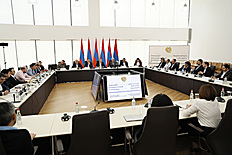 1670x1113px - 408 Kb
1670x1113px - 408 Kb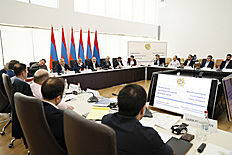 1670x1113px - 415 Kb
1670x1113px - 415 Kb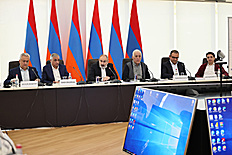 1670x1113px - 471 Kb
1670x1113px - 471 Kb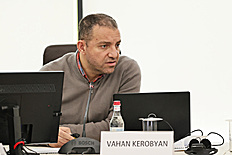 1670x1113px - 338 Kb
1670x1113px - 338 Kb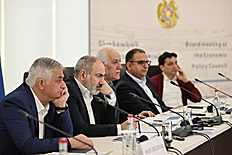 1670x1113px - 404 Kb
1670x1113px - 404 Kb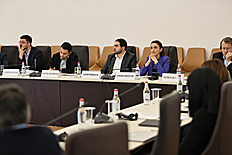 1670x1113px - 378 Kb
1670x1113px - 378 Kb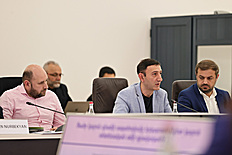 1670x1113px - 380 Kb
1670x1113px - 380 Kb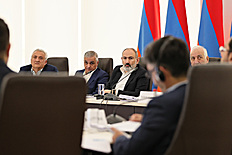 1670x1113px - 352 Kb
1670x1113px - 352 Kb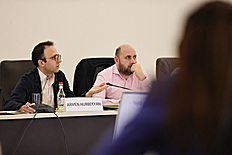 1670x1113px - 341 Kb
1670x1113px - 341 Kb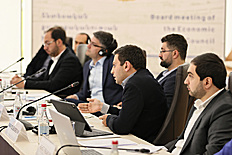 1670x1113px - 416 Kb
1670x1113px - 416 Kb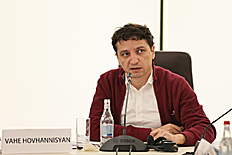 1670x1113px - 295 Kb
1670x1113px - 295 Kb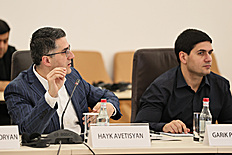 1670x1113px - 418 Kb
1670x1113px - 418 Kb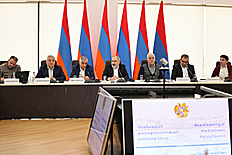 1670x1113px - 440 Kb
1670x1113px - 440 Kb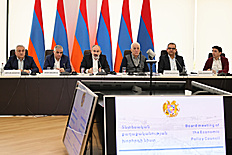 1670x1113px - 448 Kb
1670x1113px - 448 Kb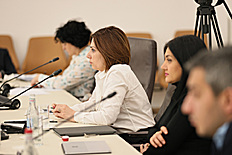 1670x1113px - 390 Kb
1670x1113px - 390 Kb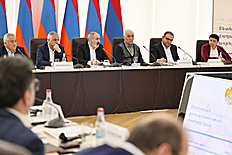 1670x1113px - 472 Kb
1670x1113px - 472 Kb
more 13 photos
Chaired by Prime Minister Nikol Pashinyan, the work of the two-day session of the Economic Policy Council under the Prime Minister continued and was summarized on April 16 in Dilijan, at the Educational-Research Center of the Central Bank.
On the second day of the session, issues related to the impact of exchange rate fluctuations on economic activity and investment environment, processes taking place in the export sector, increasing the qualification of the labor force and current economic trends were discussed.
After the discussion of the issues on the agenda, the session of the Economic Policy Council under the Prime Minister ended. Summarizing the discussions, Nikol Pashinyan said,
"Honorable President of the Republic of Armenia,
Dear Colleagues,
First I want to thank all of you for your earnest participation in our second session of the Economic Policy Council. I consider this format very important, because it takes place with the participation of the President of the Republic, the Government, representatives of the Central Bank, and experts, and we have the opportunity to approach each issue from different viewpoints and perspectives. Sometimes we make records that, while they may not be new to us, reconfirming those records is important in terms of fine-tuning policies.
I want to summarize the content of our discussion with a few points. First, in the end, what is the key goal of our economic policy? The key goal of our economic policy is to have such an economy that will be able to generate the necessary resources to have an independent, sovereign, competitive state. Such an economy can and should be geared towards a higher degree of complexity. In other words, our economic policy should aim for the economy in our country to be at a higher level of complexity. And in this regard, the investments and strategies we have in the education sector are essential, because without the investments in the education sector, this goal will not be achievable.
Moreover, I want to emphasize that saying education, we mean preschool education, general education, vocational education and training, and higher and post-university education. I consider vocational education very important, which is also about implementing labor market regulations in the economy, re-specializing people or informing people about new trends in their professions.
And the goal of all these actions and the accompanying task is ultimately to increase the productivity of the unit workforce in our country and as a result of this, the adoption of new standards in all areas of our country. As we have recorded before, today we record again that an economy with high standards and the existence of modern standards in the country in all areas, starting from the police and ending with food safety, is an important attribute that ensures sovereignty, and this is an important point.
The next fundamental, conceptual issue, which is very important, is essentially the adoption of a new mentality by taxpayers, or the Government's policy on the formation of a new mentality regarding paying taxes, which is also one of the key points of our policy in the last five years. Our important goal is that the citizens and residents of Armenia generally perceive taxes not as an outflow of financial resources from their own pocket to someone else's pocket, but rather as a transfer from their own, conventionally speaking, right pocket to the left pocket. But for this, the effectiveness of the government, good work and a principled and uncompromising fight against corruption are extremely important. Because only when the citizen has a certain conviction that the funds generated by him are not wasted through corrupt transactions, he will adopt this new tax thinking. This is also an extremely important political issue for our Government.
We also discussed the universal declaration mechanism that we are going to introduce in the near future. One of the most important goals of our discussions was that the mechanism of universal declaration of citizens not only imposes obligations and responsibilities on citizens, but also creates opportunities for them, including in social directions, in the sense of making certain expenses for education and healthcare.
Of course, as a logical continuation, our political and strategic goal is also to create sufficient, necessary economic, health, educational, security and all other necessary conditions for the development of human resources. These kind of consultations and discussions are extremely important for us and I consider the work of the Economic Policy Council session to be effective, which does not mean that we are at the peak of efficiency, but it means that these discussions are at least very useful.
Once again, I want to thank you, honorable Mr. President, our parliamentary colleagues, our experts, the representatives of the Central Bank, who are participating very enthusiastically, and wish us success in solving the problems facing our country in the most effective way."